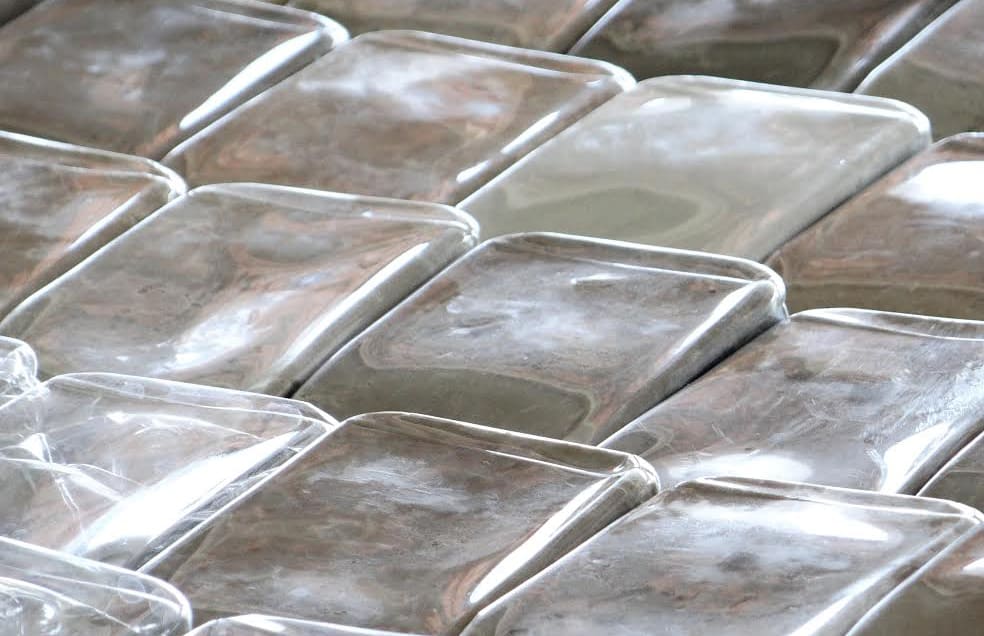Lots of people go to the beach to get away from work. Although Donald Thomson aimed to be one of them, moving to the beach actually gave him a job.
Thomson and his family have lived in Costa Rica since 1990, but as he transitioned into “partial retirement,” he and his wife, Terry- Lee, moved to Playa Pochote, a small beach town near the tourist destination Tambor on the Nicoya Peninsula. Looking for an opportunity to give back to the community where they lived, they bought a lot right on the water and founded the Ocean Symphony Music School, a volunteer program that provides local children with musical instruments and lessons.
Walking down the shore everyday, Thomson noticed that the sand was littered with plastic water bottles. The tide of plastics was even worse after a heavy rain, he observed.
Thomson and his wife started organizing a volunteer beach cleaning initiative, and one day a group of kids lined up the bottles they had collected and started jumping on them.
The flattened bottles caught Thomson’s imagination. What if these could find a new life? Maybe they could be roof tiles.
Three years later at Expotour, Thomson unveiled Agua Costa Rica, a new bottled water company that recycles its plastic as building materials for low income families.
“We are really working hard at becoming the first 100 percent zero-waste beverage container that regenerates its self into a permanent and high quality solution to housing needs,” Thomson told The Tico Times in an email.
“The cycle of poverty is often determined by where you live,” Thomson said. “Some housing projects fail because the homes people have don’t appreciate over time.”
Thomson, who has decades of experience in design and construction, said that by using plastic tiles, low income homeowners can maintain the value of their homes over time and even improve it. But first, people will need to buy the water.
Made of 100 percent recycled plastics in Costa Rica, the bottles are filled with water collected near Juan Castro Blanco National Park. The cloud forest recharges the water supply, Thomson said, reducing impact on local water consumption.
The bottles themselves look like glass bricks at first glance, clear plastic 3-inch-wide rectangles with curved tops.
Once the recycled bottles are collected, Thomson said that they press them into granite-colored tiles. The color comes in part from the reused packing materials injected into the bottles, which serves as an insulator.
“We’re not just reusing a product,” Thomson told The Tico Times, “We’re taking a waste product [discarded plastic bottles] to make a new product [Agua Costa Rica bottled water], which we then turn into a completely different good [roof tiles]. We’re not recycling, we’re out-cycling.”
The tile creator mused that the tiles might even qualify as carbon dioxide offset credits because the they sequester paper packaging that would otherwise decompose and release the greenhouse gas.
Thomson said that the 710 mL bottles would eventually go on sale for roughly $1 each. Several hotels in North America have expressed interest in selling the bottles, he said, citing confidentiality in the negotiations.
The designer acknowledged that collecting the recycled bottles was key to the company’s out-cycling philosophy.
The Agua Costa Rica founder said that the company will sell the bottled water with a small deposit, similar to the one used for glass bottles, to motivate buyers to return their empties to the store for collection.
Despite the recent buzz Thomson received for his sleek new water bottle, he stressed that bottle is simply a means to an end: cheap, quality building materials.
“We’re going to be able to sell [the roof tiles] almost at cost,” he said, “All for the price of garbage.”







